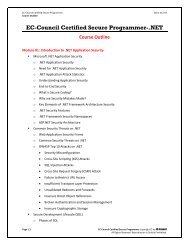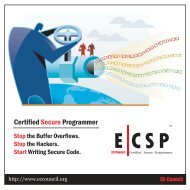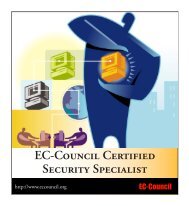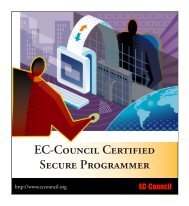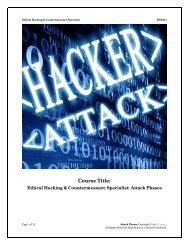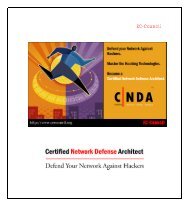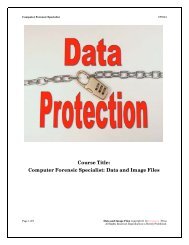Download CHFI Brochure - EC-Council
Download CHFI Brochure - EC-Council
Download CHFI Brochure - EC-Council
You also want an ePaper? Increase the reach of your titles
YUMPU automatically turns print PDFs into web optimized ePapers that Google loves.
What will you learn<br />
Students going through <strong>CHFI</strong><br />
training will learn:<br />
• The computer forensic<br />
investigation process and the<br />
various legal issues involved<br />
• Evidence searching, seizing and<br />
acquisition methodologies in<br />
a legal and forensically sound<br />
manner<br />
• Different types of digital<br />
evidence, rules of evidence,<br />
digital evidence examination<br />
process, and electronic crime and<br />
digital evidence consideration by<br />
crime category<br />
• Roles of first responder, first<br />
responder toolkit, securing and<br />
evaluating electronic crime<br />
scene, conducting preliminary<br />
interviews, documenting<br />
electronic crime scene, collecting<br />
and preserving electronic<br />
evidence, packaging and<br />
transporting electronic evidence,<br />
and reporting the crime scene<br />
• How to set up a computer<br />
forensics lab and the tools<br />
involved in it<br />
• Various file systems and how to<br />
boot a disk<br />
• Gathering volatile and nonvolatile<br />
information from<br />
Windows<br />
• Data acquisition and duplication<br />
rules, validation methods and<br />
tools required<br />
• How to recover deleted files and<br />
deleted partitions in Windows,<br />
Mac OS X, and Linux<br />
• The process involved in forensic<br />
investigation using AccessData<br />
FTK and EnCase<br />
• Steganography and its<br />
techniques, Steganalysis, and<br />
image file forensics<br />
Page:<br />
04<br />
• Password Cracking Concepts,<br />
tools, types of password attacks<br />
and how to investigate password<br />
protected files<br />
• Different types of log<br />
capturing, log management,<br />
time synchronization, and log<br />
capturing tools<br />
• How to investigate logs, network<br />
traffic, wireless attacks, and web<br />
attacks<br />
• How to track e-mails and<br />
investigate e-mail crimes<br />
• Mobile forensics and mobile<br />
forensics software and hardware<br />
tools<br />
• How to write investigative<br />
reports<br />
“<br />
The course material is up to date and very<br />
complete. It really takes you on a trip through<br />
the Security field. Each chapter has lab exercises<br />
and this makes you understand the stuff in the<br />
book much better. If you are working or want<br />
to work in the Information Security field this<br />
training is highly recommended.<br />
“<br />
- Martin de Kok, Sr Security Officer,<br />
Netherlands.<br />
<strong>EC</strong>-<strong>Council</strong><br />
Computer Hacking Forensic Investigator



